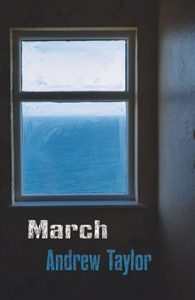March
 With every journey comes a risk of falling into melancholy – a passing landscape can spark a memory of a person, home, a string of events. These brief glimpses are at the heart of Andrew Taylor’s second poetry collection, March. The collection begins with “The Welsh Hills”:
With every journey comes a risk of falling into melancholy – a passing landscape can spark a memory of a person, home, a string of events. These brief glimpses are at the heart of Andrew Taylor’s second poetry collection, March. The collection begins with “The Welsh Hills”:
it starts with a bell
then the harmoniumit is Sunday after all
a piano wheeled
to winter beach before being chopped [.]
The collection’s very first words bring vibrant sounds onto the page; the familiar noises of a regular Sunday mix with an image of grief and nostalgia. The narration keeps springing from senses to memory, first introducing an image, sound, smell – a glimpse of something tangible – then shifting the focus to what’s private. Yet this intimacy is required to retrieve more from mere sensory experiences:
You have to get above the air
to properly taste the lemon [.](“Shipping”)
The lemon’s taste and the bell’s sound are loaded with memories and personal meanings. Reading March is a meditative exercise. Taylor presents easily accessible images that serve as a corridor into the rooms of his life, some more decorated than others. To fully appreciate them, one must distinguish one’s own preconceptions from the way the world is presented in the collection – not always beautiful, but painfully real and detailed:
Greenness of meadow
redness of terminus lights(…)
there’s blood there’s soil
there are generations [.](“Honesty Box”)
Taylor’s keen eye is undeniable, and it shows throughout the whole collection. At times, it’s hardly discernible from imagination. Nevertheless, his travels are engaging, introspective and central to the book. The longest poem included in March – “Network” – is a curious experiment, each line starting with the name of a railway station in Liverpool, followed by a short line of text, both contributing to the development of the story:
MEOLS Red frame white light rose bush bridge
[…]
JAMES STREET cleanliness of white but for how long?
[…]
BOOTLE NEW STRAND tower blocks star of the sea
[…]
SPITAL meeting place twenty years apart[.]
(“Network”)
The poem’s rigid structure is broken in the middle by dialogue – an exchange of text messages provide the necessary context to the story. In March, simple lines are intertwined with complex ones, making simplicity feel like vulnerability. The following words are taken from one of the most compelling poems of the collection:
take it easy with the drugs
“Where’s Sean?”
“He’ll be laying on his back looking at the stars”[.]
(“Diamond Tea”)
The sound of silence following these lines melds with the sounds the author uses to convey states of mind:
Paris never
sounded so good(…)
Dust dampened
movement restrictsWeather forces
indoorsconsideration[.]
(“Plated Echo”)
This poem represents the technique that Taylor uses extensively throughout March: line breaks. Not only does it add to the meditative feeling of the collection, forcing the reader to slow down and reflect, but also offers alternative understandings of the poem. In the above example, the break could come either after ‘Weather’ or ‘forces’ and shift the meaning; the implications of either possibility are left open to the reader.
March is a diverse and rich collection and I’m unable to offer more than a glimpse into it. From surprising wordplay to beautiful landscapes and heart-breaking, haunting lines, it is a slow and difficult read. Taylor invites us to see the world the way he does. Like every journey, this one, too, must end. Here I will include the final goodbye, for an ending can be as good a beginning as the beginning itself:
there is a wind within dreams
falling from the sunthrough summer fog stand still
until we are the last[.](“Go, Take in the Beauty”)

Leave a Reply